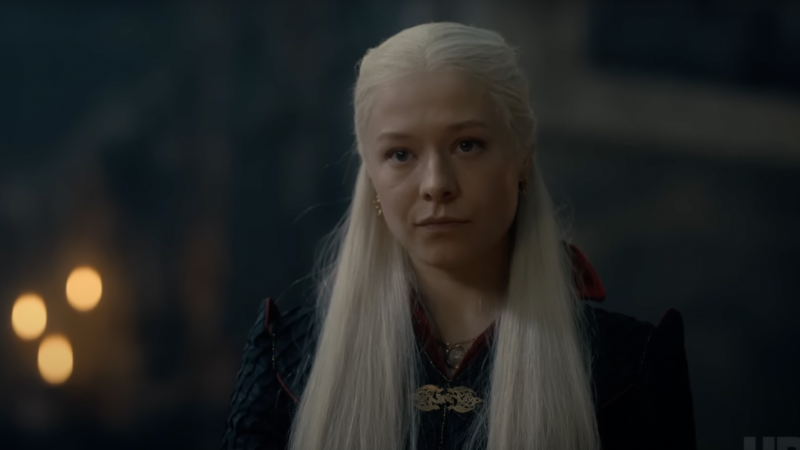
For most of House of the Dragon's terrific first season finale, Rhaenyra—now a queen, albeit a disputed one—shows remarkable calm and poise. She tempers her vassals' passions and warns her sons not to start any fights. She even restrains her husband, Prince Daemon—or tries to, at any rate.
Rhaenyra's refusal to use her side's superior firepower (vis a vis dragons) to obliterate her enemies feels like a deliberate echo of Daenerys from the original series, Game of Thrones. Daeny, too, initially refused to simply burn down everything that stood between her and the Iron Throne. But we all know how that turned out: GOT's writers became lazy and bored with the story, and decided to make Daeny go insane with insufficient setup, spoiling six seasons' worth of solid character development. (And Daeny got off easy, compared with Jon Snow, Tyrion, Jaime, Cersei, and a dozen others who deserved more satisfying endings.)
George R.R. Martin, author of A Song of Ice and Fire, the novels on which both GOT and HoTD are based, has much more direct creative control over this new series; thus far, his increased involvement has proven beneficial. If Rhaenyra decides to embrace a darker path following the gruesome death of her second-born son, that character arc will already feel much better plotted than Daeny's last-minute madness.
Indeed, many viewers probably feel themselves positively rooting for Rhaenyra to go full-Targaryen and burn down King's Landing. That's a credit to the empathetic expressiveness of actor Emma D'Arcy, who stepped into the role midway through the season and had much less time on screen than the equally alluring Milly Alcock, who portrayed Rhaenyra as a teenager through the first five episodes. But it's also a credit to the story and the circumstances: It's easy to see how a relatively benign political figure could become bloodthirsty and unstable after suffering such losses—and whatever vengeance she extracts will undoubtedly feel partly justified. That vengeance will in turn beget more vengeance, which will produce reciprocal violence, and well… that's why wars tend to last a long time and kill a great many people: in fiction, and in real history.
Those who suffer the most, of course, are the common people who man ships, comprise armies, and serve as dragon fodder. Viewers had a taste of that last week, during the penultimate episode, when Princess Rhaenys and her dragon crashed the greens' coronation, inadvertently crushing dozens of peasants. Inasmuch as the greens are essentially the bad guys and whomever opposes them are essentially the good guys (maybe not Daemon), this felt like a moment of triumph—even though the actions of the good guy (Rhaenys) killed many innocent people.
It's hard not to draw some parallels to the current Russia-Ukraine conflict, in which a straightforward tale of good and evil comes up against cold, hard reality. Russia's ruler is tyrannical, and started the conflict by illegally invading Ukraine, and thus resisting Russia feels like the morally correct choice; on the other hand, sheer practicality might argue that it's foolish to start World War III over a slice of disputed territory in Eastern Europe; on the other other hand, if Russia can just take whatever it wants and face no consequences, world peace is similarly imperiled; on the other other other hand, Ukraine has some unsavory characters fighting for it, and some Ukrainians actually want to be part of Russia.
Rhaenyra and Daemon hit on many of these same points whilst debating what to do. Daemon argues that the greens' monstrous actions have given them no choice but to go to war; be that as it may, Rhaenyra counters, her faction has no obligation to respond in kind. It's not exactly a spoiler to predict that Daemon has likely won this argument quite definitively, which just goes to show that violence is a seductive option for political actors, as well as for dragons.
The post Violence Begets War on the <em>House of the Dragon</em> Finale appeared first on Reason.com.







